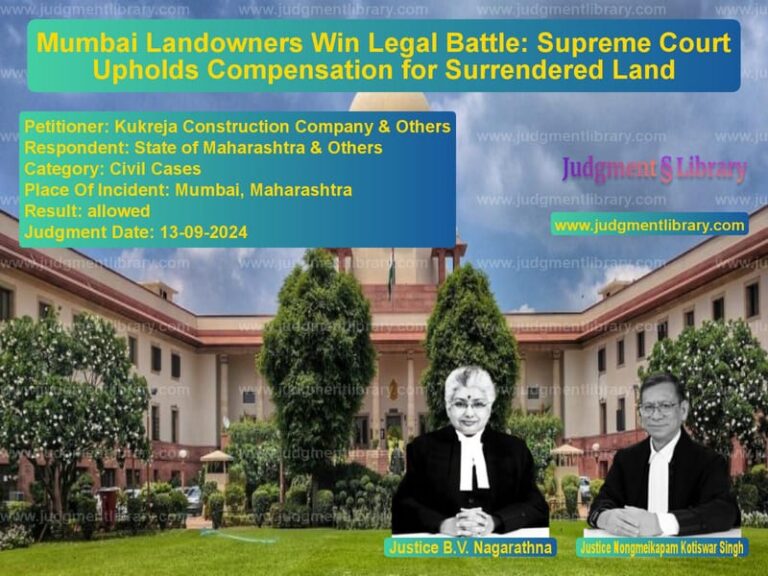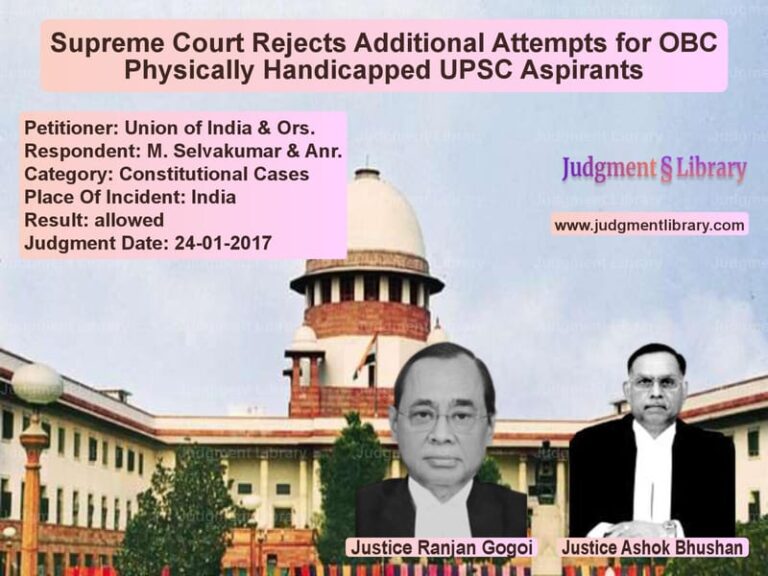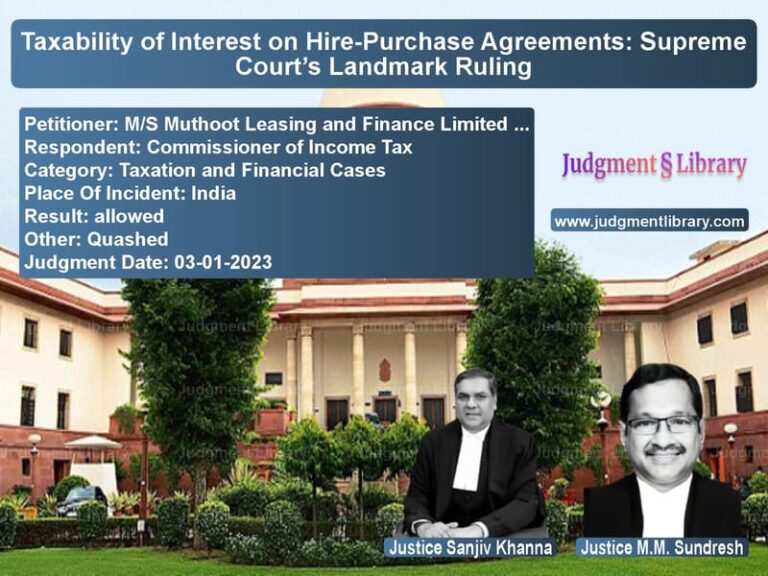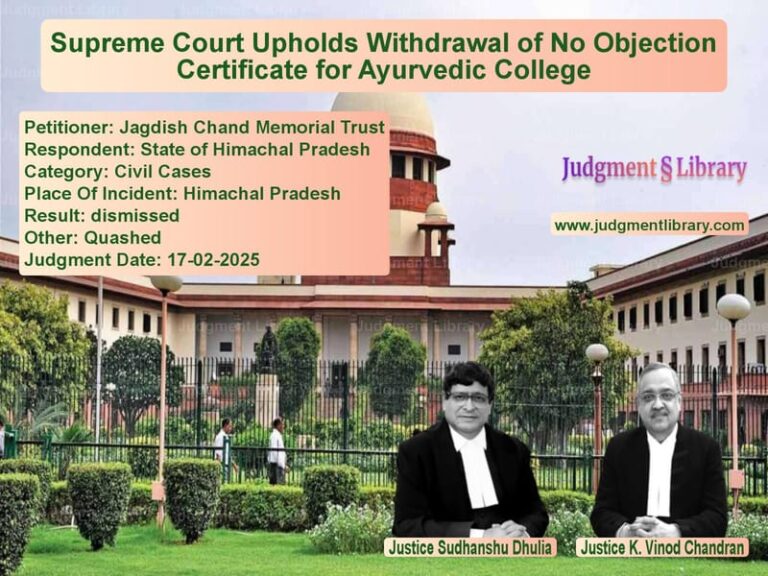Corporate Property Dispute: Supreme Court Upholds Company’s Right to Reclaim Possession
The case of Hooghly Mills Company Ltd. vs. The State of West Bengal & Anr. revolves around a corporate property dispute concerning the wrongful withholding of company property by a former director. This judgment highlights the applicability of Section 630 of the Companies Act, 1956, which penalizes officers or employees who wrongfully retain company property after cessation of employment.
Background of the Case
Dispute Over Possession
Hooghly Mills Company Ltd., an existing company under the Companies Act, 1956, entered into an agreement for the purchase of a flat in Kolkata on April 26, 2008. Under the agreement, the company was granted possession of the property upon payment of a monthly rent of Rs. 84,275. However, Mr. Bal Binode Bajoria, a former director, refused to vacate the premises after his removal from the board of directors in November 2008.
Legal Actions Taken
- The company repeatedly requested the respondent to vacate the property, but he refused.
- A criminal complaint under Section 630(1) of the Companies Act was filed against the respondent on August 11, 2009.
- During the pendency of the complaint, an application under Section 630(2) was filed for immediate dispossession of the respondent from the disputed property.
Legal Issues and Arguments
Petitioner (Company) Arguments
- The respondent continued to occupy the company’s property without any legal right.
- The company’s agreement for the purchase of the property gave it the right to possess the premises.
- The respondent’s claim of an oral agreement with the original owner was unsubstantiated.
- The presence of a civil suit should not bar the company’s right to criminally prosecute the wrongful withholding of its property.
Respondent (Former Director) Arguments
- He had an oral agreement with the deceased previous owner of the property, granting him the right to purchase it.
- The company’s criminal complaint was a scheme to oust him illegally.
- The disputed property was in his possession since 1994, and the company had no legitimate ownership rights.
- The ongoing civil suit should take precedence over criminal proceedings.
Supreme Court’s Observations
On Maintainability of Criminal Proceedings
The Court ruled that a criminal complaint under Section 630 could be maintained alongside civil proceedings. It observed:
- “The pendency of a civil suit does not bar a criminal complaint under Section 630, particularly where the company’s right to the property is undisputed.”
- “An oral agreement alone cannot establish a bona fide dispute over ownership.”
- “The respondent had failed to provide any documentary evidence supporting his claim of ownership.”
On Section 630 of the Companies Act
The Court reaffirmed that Section 630 aims to ensure the speedy recovery of company property. It ruled:
- “The term ‘officer or employee’ includes former officers who continue to wrongfully withhold company property.”
- “The provision should be given a liberal interpretation to prevent employees from indefinitely retaining company property.”
On the High Court’s Intervention
The Supreme Court found that the High Court had wrongly set aside the lower court’s order directing the respondent to vacate the property. It ruled:
- “The High Court erred in exercising its inherent powers under Section 482 Cr.P.C. to interfere with the trial court’s order.”
- “The company was entitled to possession, and the respondent had no legal basis for withholding it.”
Final Judgment
The Supreme Court set aside the High Court’s judgment and upheld the company’s right to reclaim the property. The respondent was directed to vacate the premises immediately.
Key Takeaways
- Section 630 applies to former employees: Companies can reclaim property from ex-officers who continue to withhold possession.
- Criminal and civil proceedings can run parallel: A civil dispute does not prevent criminal prosecution under Section 630.
- Companies need not prove ownership: The law focuses on the wrongful withholding of possession, not ownership.
- The doctrine of mutuality does not apply: Employees or directors cannot claim ownership over company property.
Conclusion
The Supreme Court’s ruling reinforces the rights of companies to swiftly reclaim possession of their properties from former employees or directors. By clarifying the scope of Section 630, the judgment ensures that corporate assets are not wrongfully held by individuals beyond their tenure in the company.
Petitioner Name: Hooghly Mills Company Ltd..Respondent Name: The State of West Bengal & Anr..Judgment By: Justice Mohan M. Shantanagoudar, Justice Ajay Rastogi.Place Of Incident: Kolkata, West Bengal.Judgment Date: 17-10-2019.
Don’t miss out on the full details! Download the complete judgment in PDF format below and gain valuable insights instantly!
Download Judgment: Hooghly Mills Compan vs The State of West Be Supreme Court of India Judgment Dated 17-10-2019.pdf
Direct Downlaod Judgment: Direct downlaod this Judgment
See all petitions in Company Law
See all petitions in Corporate Governance
See all petitions in unfair trade practices
See all petitions in Bankruptcy and Insolvency
See all petitions in Judgment by Mohan M. Shantanagoudar
See all petitions in Judgment by Ajay Rastogi
See all petitions in allowed
See all petitions in supreme court of India judgments October 2019
See all petitions in 2019 judgments
See all posts in Corporate and Commercial Cases Category
See all allowed petitions in Corporate and Commercial Cases Category
See all Dismissed petitions in Corporate and Commercial Cases Category
See all partially allowed petitions in Corporate and Commercial Cases Category







